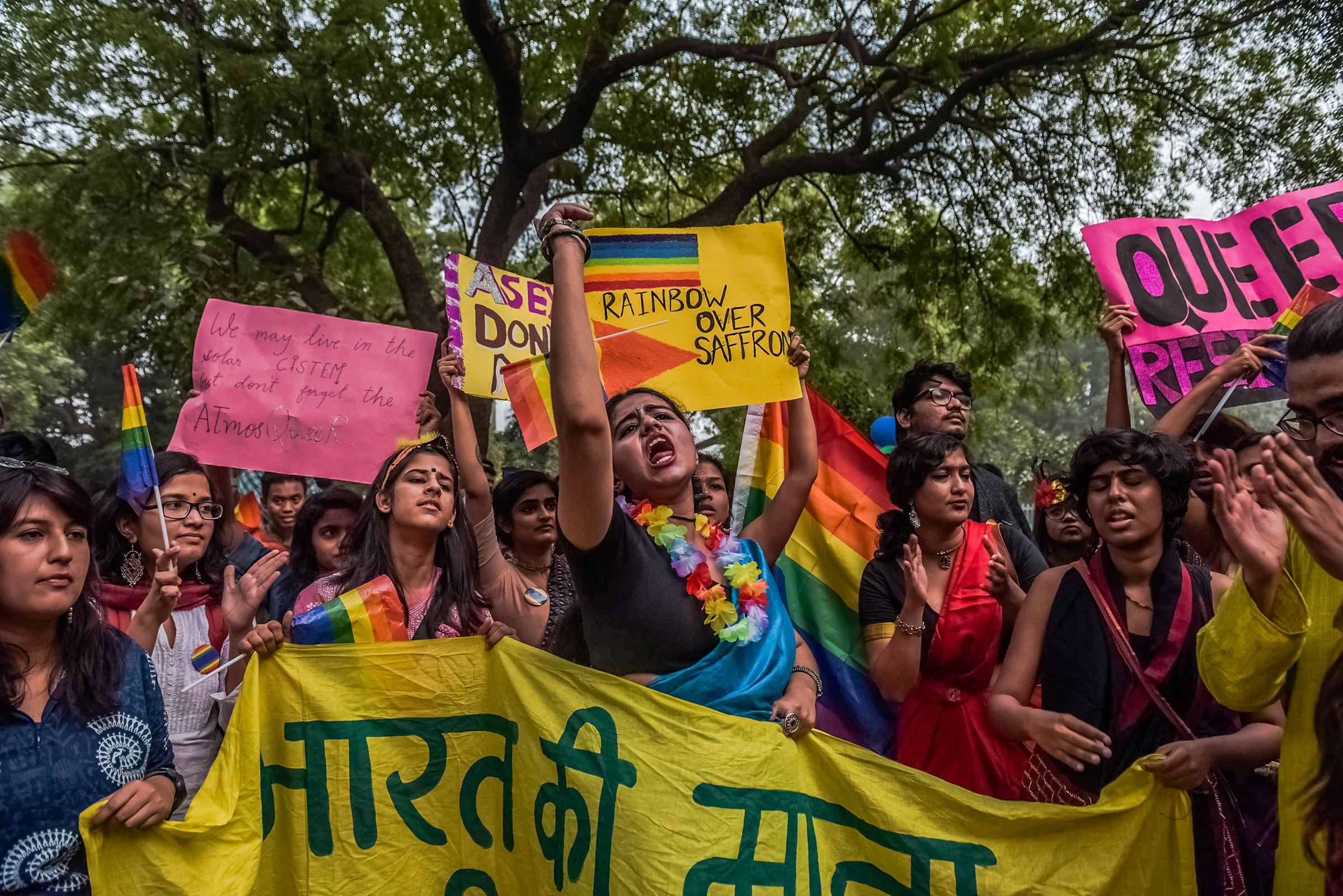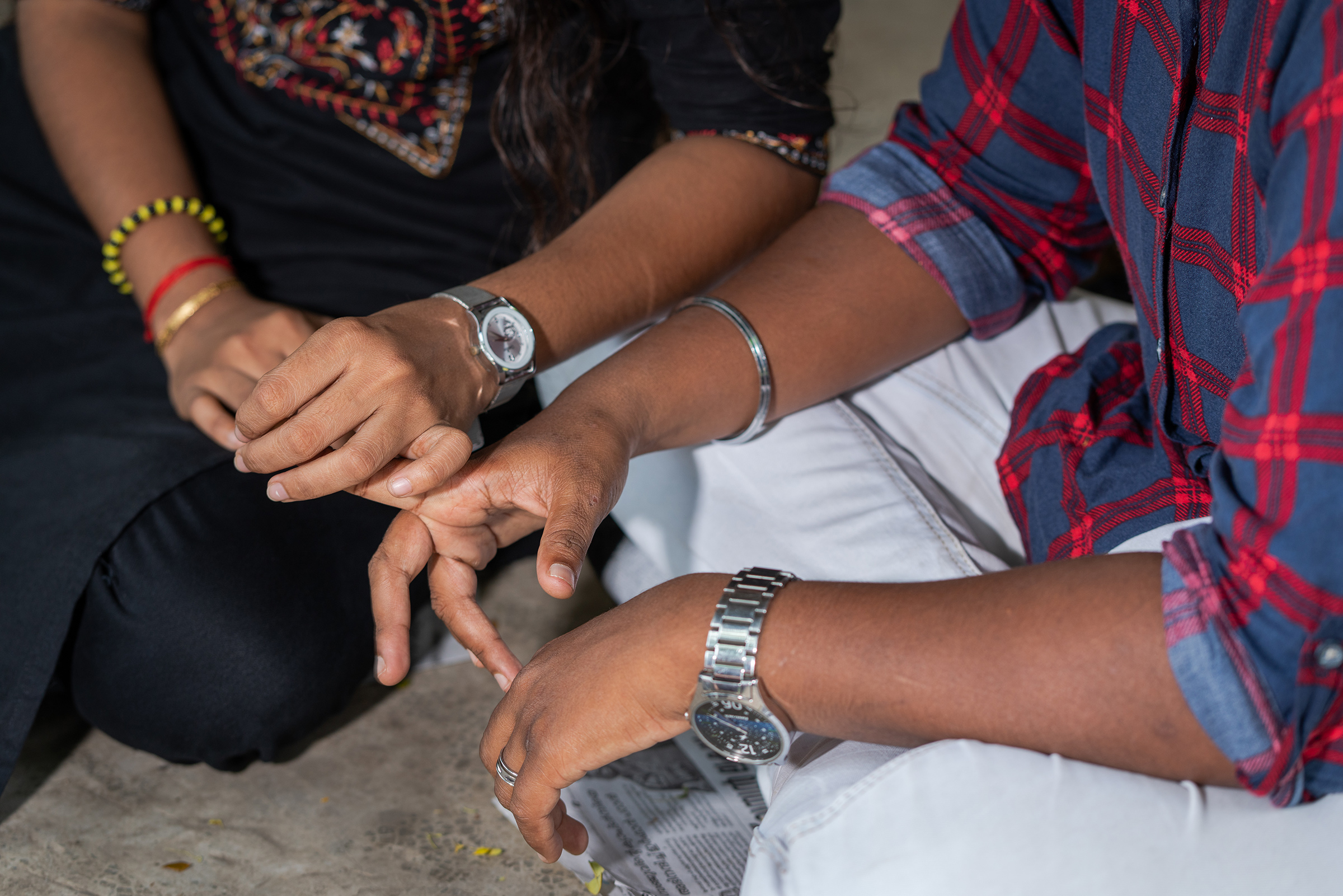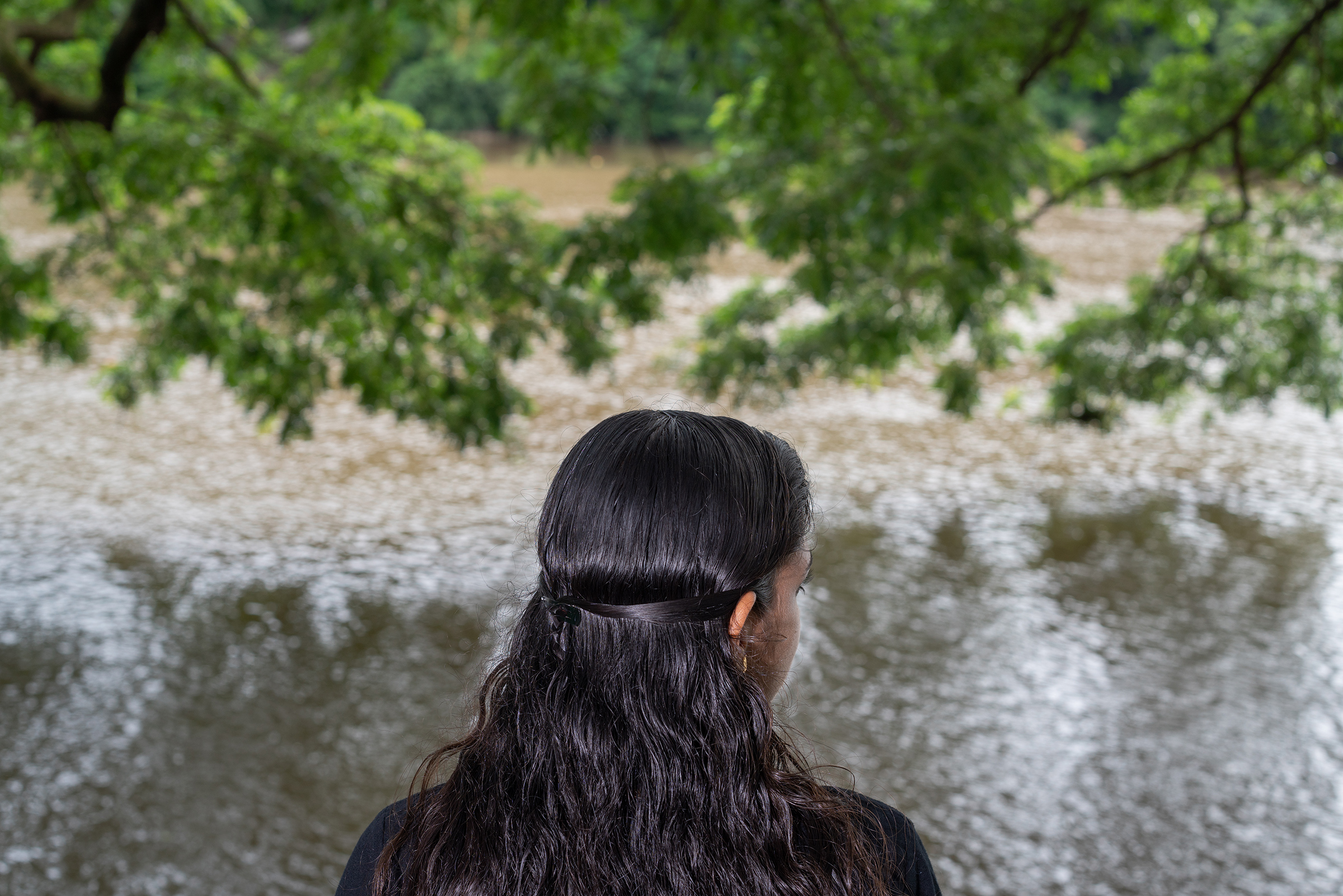One morning in June 2020, Meenakshi Sajeesh, a shy and petite woman in her 20s with wavy black hair hanging past her waist, got into her father’s auto rickshaw. Her parents had insisted she accompany them on a trip, though they didn’t tell her where they were going. Two hours after departing the town of Angamaly, the family arrived at the Malankara Orthodox Syrian Church Medical College in Kochi, in the southern Indian state of Kerala. Sajeesh felt her stomach drop. A few weeks earlier, she had told her parents she was a lesbian; now she realized they had brought her here in an attempt to “cure” her.
As Sajeesh stepped into the doctor’s office, she texted friends to let them know her whereabouts. She also pressed the “record” button on her phone—knowing she might one day need proof of what was about to transpire. “Then, I hid my phone, in case they locked me up or took me somewhere,” she recalls.
The doctor was a middle-aged woman named Santha Abraham who told her mother, “Let’s try to change her.” The visit lasted several hours, Abraham insisting that Sajeesh check into the hospital’s psychiatric ward for further treatment without divulging any more details about what treatment there would entail.
Sajeesh flatly refused. “I told them I didn’t want to change because there was nothing wrong with me in the first place.”
Either way, the doctor’s words had given her parents “false hope” and left her feeling traumatized. She told her parents then and there that she would never enter an institution like that again. Standing up for herself was a life-changing moment: “I don’t know if I would be alive today if I had agreed. I feel like I wouldn’t even have stepped out of that place,” she says. (Sajeesh requested that TIME use a pseudonym to protect her safety. Abraham declined request for comment on this article.)
Sajeesh’s experience with Abraham, along with a recording of their conversation, is now part of the evidence for a writ of petition filed in October 2020 at the High Court of Kerala by Queerala, a community-based LGBTQ organization. It lists Sajeesh as a co-petitioner, along with a 46-year-old woman who came out to her husband in 2018 after experiencing marital problems and undergoing counseling sessions with a psychologist to “correct” her sexual orientation.
The petition seeks to place an outright ban on the practice of “conversion therapy,” an umbrella term used for harmful and scientifically discredited treatments for changing an individual’s sexual orientation, gender identity, or gender expression. It follows a 2019 fact-finding mission undertaken by Queerala where at least 20 medical practitioners were conducting “conversion therapy” in the state. If successful, the petition would require the high court to pass orders to criminalize those who advocate for conversion therapy. If rejected, Queerala representatives say they would appeal the decision at the Supreme Court.
More from TIME
Read More: This Indian Same-Sex Couple Is Fighting for the Right to Marry. But Is Their Country Ready?
Across India, medical practitioners and health care professionals offer conversion therapy in the form of counseling, medication, institutionalization, hormone injections, and even electro-convulsive therapy and hormonal castration. Outside of medical settings, spiritual godmen and gurus also espouse cures through religious rituals, “corrective” rape, and other forms of physical violence. Rajashree Raju, a Queerala board member who regularly assists survivors, says many people—practitioners and families alike—don’t see how such practices are forced upon individuals and are often incredibly harmful. “If there was a law against it, we can counter what is essentially harassment,” Raju says.
In an interim hearing in December 2021, Kerala’s high court ordered the state government to form new guidelines—consulting organizations like Queerala—around the practice. The government was supposed to submit these guidelines by May of this year, but the consultations were only held in late June.
Queerala’s Raju said she felt optimistic about the outcome of the consultations, but also weary about the duration. “We expected the state of Kerala, which projects itself as queer-friendly and inclusive, to act quickly,” she explains, “but the response has been really slow.”
Sajeesh’s refusal to undergo conversion therapy has permanently affected her relationship with her parents. She says she agreed to submit her recording to the court as Queerala’s co-petitioner to prevent it from happening to others, and to play her part in protecting the rights of her community. “It’s not a small thing to stop conversion therapy as such,” she says quietly and shrugs, “but you have to do whatever you can in your power.”

I met Sajeesh and her partner Sandhya Rajakumar at a sprawling green public park overlooking a muddy river near Kochi’s airport one humid afternoon this summer. Sajeesh was wearing a traditional black suit, while Rajakumar sported a red plaid shirt over blue jeans and short, spiky hair. Yellow bindis adorned their foreheads from a visit to a Hindu temple earlier that morning. Here, in a secluded corner, they could avoid the unwanted attention of strangers and speak freely about Sajeesh’s experience with conversion therapy. (Rajakumar’s name has also been changed to protect her privacy.)
The couple first spotted each other in July 2019, on a train carriage during their daily commute to work. Sajeesh, 25, works as a technician at an architectural firm, while Rajakumar, 30, is an accountant. “We used to stare at each other a lot. Then one day Meenakshi came up to me and said, ‘Why are you looking at me so much?’” Rajakumar recalls with a laugh.
They added each other on Facebook, swapped phone numbers, and began talking frequently. Eventually, they confessed mutual feelings for each other. At home, where Sajeesh lives with her parents and a younger brother, delayed plans for her marriage left her parents feeling frustrated, especially when Sajeesh rejected a potential match for a husband. “Our usually happy household was turning into a very sad and uncomfortable place,” she says.
Eventually, Sajeesh told her mother that she liked women. To her surprise, her mother responded nonchalantly: “It’s just a phase, if you don’t act on your feelings, it will go away in time,” she recalls her mother saying. But that changed when she brought Rajakumar home. “My mom began to cry and told me, ‘You can change this,’” she says. Soon after, her parents began discussing “cures” and treatments.
Before the hospital ordeal, Sajeesh’s parents took her to a counseling session at a Christian convent. That’s where she first heard the term “conversion therapy.” Until then, she barely knew what identifying as LGBTQ meant; her understanding of her own sexuality mostly came from TikTok videos and Facebook posts. But after seeing such strong reactions from her parents to her coming out, she felt compelled to plan for her safety. Sajeesh and Rajakumar contacted Dhanya Ravindran, a queer activist and board member at Queerela, for advice on how to cope with the hostility, and joined community groups on Facebook to seek out support. It was here that she got the idea to record any conversations with doctors and make a list of contacts to reach out to in case of an emergency. Sajeesh was able to stand up to the doctor at the hospital, but she still hasn’t received her parents’ acceptance. “Even today, my mother still believes that I can be converted,” Sajeesh says.

The consequences of being subjected to conversion therapy can be fatal: in March 2020, a 21-year-old student named Anjana Harish posted a lengthy video on Facebook, in which she detailed her harrowing experience with forced conversion therapy. Harish had only recently come out to her parents as bisexual before she was bundled into a car by her parents and taken to Coimbatore, a city in South India, where she says she was assaulted, sedated, and left in isolation at a “de-addiction” center for nearly three weeks. After Harish was released from the center, she ran away from home to a shelter. “My own family did this to me, that’s what saddens me the most,” she said in the video. Two months later, she died by suicide.
Harish’s tragic death put a national spotlight on conversion therapy, revitalizing efforts to end the practice that have been under way for several years. One such effort brought about a landmark Supreme Court ruling in 2018 that decriminalized homosexuality—stating that homosexuality was not a “mental disorder or a disease”—and discouraged conversion therapy. The Indian Psychiatric Society (IPS) followed the verdict with an official statement that said any form of treatment or therapy to reverse sexual orientation was based on an “erroneous” and “unscientific” premise that such orientations are diseases.
But the Supreme Court ruling and IPS verdict have no legal force over conversion therapy specifically. Only the Mental Healthcare Act, which came into effect in 2017 with the intention of decriminalizing suicide, offers some protective measures at a national level against conversion therapy. It bars any discrimination against patients on the basis of gender and sexual orientation, further requiring medical professionals to seek “informed consent” before treating LGBTQ patients. The law still leaves it up to state governments to comply with these directions, and it covers only medical practitioners—leaving the door open for spiritual gurus that subject people to harmful practices.
Despite the growing attention, Prime Minister Narendra Modi’s Hindu nationalist government has not made any public statements on conversion therapy. The government has generally had a spotty record on LGBTQ rights, with the Solicitor General previously stating that “our values do not recognize marriage…between same-sex couples.” Same-sex couples remain unable to access marriage and are prohibited from co-owning property, obtaining joint loans or life insurance, and adopting children. In April, Shashi Tharoor, a Member of Parliament from the opposition Congress Party, wrote to Smriti Irani, the Minister of Women and Child Development in Modi’s cabinet, seeking a series of measures to discourage conversion therapy. Tharoor says he has not received a response.
In the absence of India-wide laws, the high courts, which sit below the Supreme Court and have jurisdiction over local states, have become more proactive. A landmark judgment at the Madras High Court last June made the southeastern state of Tamil Nadu the first and only Indian state to ban conversion therapy. The case involved a lesbian couple where both sets of parents were opposed to their relationship and filed missing-person reports after the two women left their homes. The couple approached the courts to seek protection after facing harassment from the police, as well as their families. The court ruled in their favor, and then issued a slew of guidelines to the government to set up shelter homes and create awareness programs for legal authorities and families of LGBTQ members.
In that ruling, Judge N. Anand Venkatesh even spoke about undergoing counseling and meeting with LGBTQ leaders to overcome his own bias against LGBTQ people. “I have no hesitation in accepting that I, too, belong to the majority of commoners who are yet to comprehend homosexuality completely,” he wrote. LGBTQ activists hope Venkatesh’s decision could inspire a similar outcome for several cases in Kerala’s High Court that are centered around conversion therapy, including the one filed by Queerala and Sajeesh.
India is not exactly an outlier when it comes to conversion therapy. Only 14 countries around the world to date have implemented some form of a national ban on conversion therapy, including Brazil, Taiwan, Argentina, Germany, and most recently, New Zealand. The U.K. has pledged to ban the practice, but the government has said the ban will not protect trans people. And in the U.S., there are no federal laws against conversion therapy, though some 20 states have implemented bans of varying forms.
To get a global picture, the United Nations Human Rights Council (OHCHR) conducted a survey in July 2020 with over 8,000 individuals who identified as LGBTQ from over 100 countries. Some 32% of respondents said they were aware that conversion therapy occurs in the country where they live, and 20% indicated that either they or someone they know had been subjected to it.
The U.N. has called for a global ban on conversion therapy and noted in its 2020 report that countries needed to urgently carry out measures against it, especially to protect children and young people. “The degrading nature of many conversion therapy practices … contribute to an overall dehumanizing environment towards persons with diverse sexual orientation or gender identity,” said Victor Madrigal-Borloz, an independent expert on sexual orientation and gender identity.
In the current landscape in India, Sajeesh and Rajakumar, who continue to fight for their right to be together, feel that LGBTQ rights have only gained “small, marginal wins.” They say it will take a long time before they can live more freely. For now, they are trying not to plan too far ahead. “We are not thinking of big, big things because there’s a very high chance it won’t be possible in this place,” Sajeesh says. For this reason, Rajakumar wants to move abroad. “I have a cousin in Germany who said people there live very openly and don’t have to hide,” she says.
Ever since that day in the hospital, Sajeesh’s father hasn’t spoken a word to her. Her mother continues to pray for her “cure.” Despite these circumstances, Sajeesh would prefer not to leave the country. “I want to stay here,” she says, squeezing Rajakumar’s hand. “And show all these people that I’m capable of living my life.”
With additional reporting by Anna Kattampally
More Must-Reads from TIME
- How Donald Trump Won
- The Best Inventions of 2024
- Why Sleep Is the Key to Living Longer
- Robert Zemeckis Just Wants to Move You
- How to Break 8 Toxic Communication Habits
- Nicola Coughlan Bet on Herself—And Won
- Why Vinegar Is So Good for You
- Meet TIME's Newest Class of Next Generation Leaders
Write to Astha Rajvanshi/Kochi, India at astha.rajvanshi@time.com
